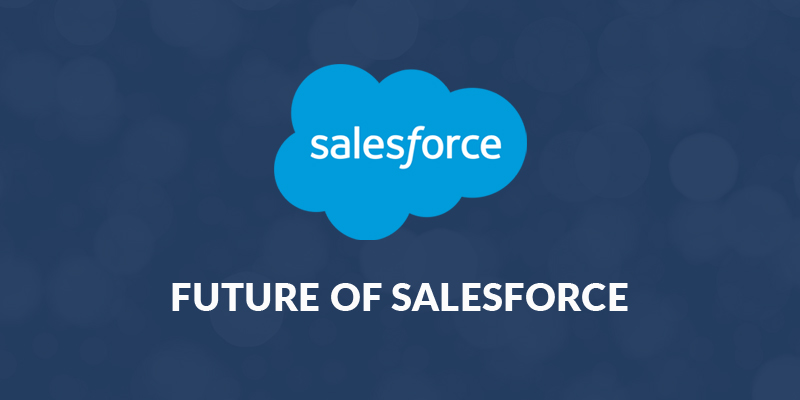
Salesforce is a name that has become synonymous with customer relationship management (CRM) and innovation. With over 150,000 customers worldwide, Salesforce has been changing the way businesses interact with their customers since 1999. It has become a platform that helps organizations of all sizes and industries manage their customer data, automate business processes, and drive revenue growth. However, with technology constantly evolving and the business landscape changing, it's natural to wonder what the future holds for Salesforce and what the platform will look like in the coming years.
In this blog, we'll take an in-depth look at some of the key trends and developments that are shaping the future of Salesforce and what you can expect to see in the coming years.
1. Increased Emphasis on Artificial Intelligence (AI) and Machine Learning (ML)Artificial intelligence (AI) and machine learning (ML) are rapidly becoming integral components of business technology. AI and ML algorithms can analyze large amounts of data, automate routine tasks, and provide valuable insights in real time. Salesforce has already made significant investments in these areas, and we can expect to see more AI and ML capabilities integrated into the platform in the future.
One of the most exciting applications of AI and ML in Salesforce is in the area of customer engagement. With AI-powered virtual assistants and chatbots, organizations can provide 24/7 support to their customers, even when human agents are not available. These virtual assistants can also be trained to understand customer sentiment and respond in a way that is in line with the customer's needs and expectations. This not only improves the customer experience but also helps organizations save time and resources by reducing the need for manual interventions.
AI and ML can also help organizations make better, data-driven decisions. For example, AI-powered predictive analytics can analyze customer data and provide insights into customer behavior, helping organizations to identify trends and patterns. This can be used to predict customer churn, recommend products, and optimize marketing campaigns.
2. Greater Focus on Customer ExperienceCustomer experience is becoming a top priority for organizations, and Salesforce is well-positioned to help companies deliver exceptional experiences to their customers. In the coming years, we can expect to see Salesforce continue to develop new features and capabilities that help organizations better understand and engage with their customers.
For example, personalized recommendations, based on customer data and behavior, can be used to recommend products and services to customers, improving the chances of conversion. Augmented reality (AR) experiences can also be used to enhance customer engagement, allowing customers to explore products and services in a more immersive way.
In addition to these features, we can also expect to see the continued evolution of voice-powered virtual assistants, such as Amazon's Alexa and Google's Assistant. These assistants can be integrated with Salesforce, allowing organizations to provide voice-powered support to their customers, without the need for manual intervention.
3. Expansion into New Industries and MarketsSalesforce has already expanded into a number of industries and markets beyond traditional CRM, and this trend is expected to continue in the future. For example, Salesforce is already making inroads into the healthcare industry, where it is helping healthcare organizations to improve patient engagement and streamline operations.
In the coming years, we can expect to see Salesforce continue to explore new markets and industries, bringing its unique blend of customer-centric innovation to new customers and stakeholders. This will help organizations in these industries to improve their customer engagement, streamline their operations, and drive revenue growth.
4. Growing Integrations with Other Technologies
Salesforce has always been a leader in integration, allowing organizations to connect the platform with other systems and technologies they use. In the coming years, we can expect to see Salesforce continue to expand its integrations with other technologies, such as IoT, blockchain, and robotics, to name a few.
For example, the integration of Salesforce with IoT technologies will allow organizations to collect real-time data from connected devices, improving their understanding of customer behavior and preferences. This data can then be used to personalize customer experiences and improve customer engagement.
Similarly, the integration of Salesforce with blockchain technologies will bring new levels of security and transparency to customer data, ensuring that customer information is always secure and accessible only to those who need it.
5. Greater Focus on Sustainability
Sustainability is becoming an increasingly important issue for organizations, and Salesforce is no exception. In the coming years, we can expect to see Salesforce continue to focus on sustainability, both in terms of its own operations and the impact its platform has on the environment.
For example, Salesforce has already committed to being carbon neutral by 2050, and the platform is designed to be highly scalable and efficient, reducing the need for physical infrastructure and reducing the carbon footprint of organizations that use it.
In addition, Salesforce is also focused on sustainability from a social perspective, helping organizations to build more sustainable relationships with their customers and communities. For example, the platform can be used to track and manage sustainability initiatives, such as energy efficiency programs, waste reduction initiatives, and community engagement programs.
Conclusion
Salesforce is one of the most innovative and forward-thinking companies in the world, and the future of the platform looks bright. With a focus on artificial intelligence, machine learning, customer experience, sustainability, and growing integrations with other technologies, we can expect to see Salesforce continue to evolve and innovate in the coming years.
As organizations look to improve their customer engagement and drive revenue growth, Salesforce will remain an essential platform, providing organizations with the tools they need to succeed in an ever-changing business landscape.